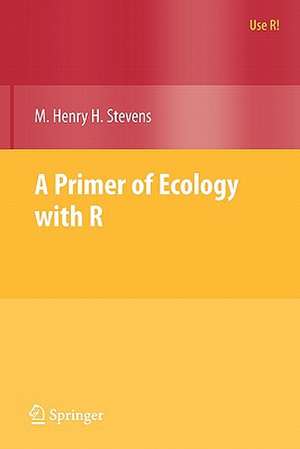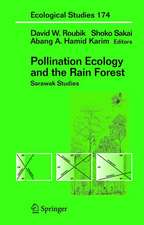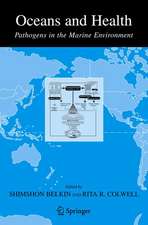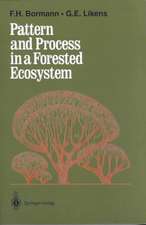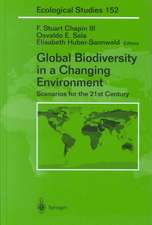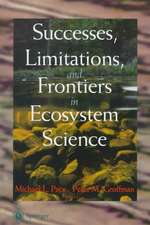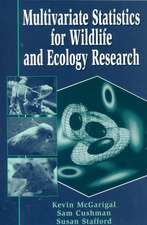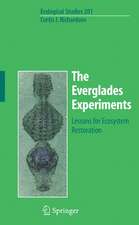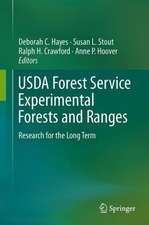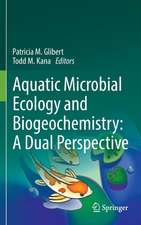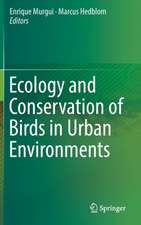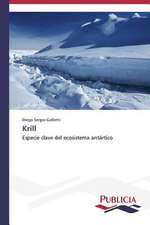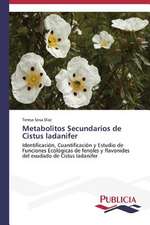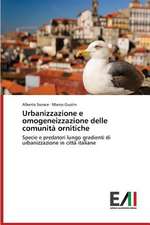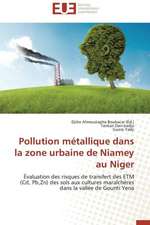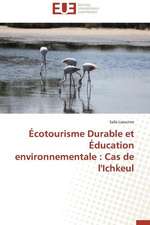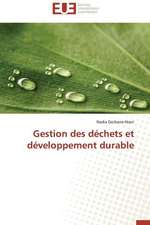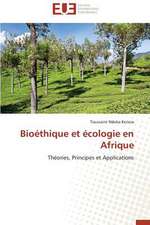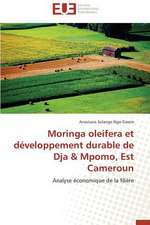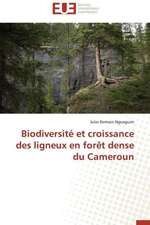A Primer of Ecology with R: Use R!
Autor M. Henry Stevensen Limba Engleză Paperback – 11 iun 2009
In addition to the most basic topics, this book includes construction and analysis of demographic matrix models, metapopulation and source-sink models, host-parasitoid and disease models, multiple basins of attraction, the storage effect, neutral theory, and diversity partitioning. Several sections include examples of confronting models with data. Chapter summaries and problem sets at the end of each chapter provide opportunities to evaluate and enrich one's understanding of the ecological ideas that each chapter introduces.
R is rapidly becoming the lingua franca of quantitative sciences, and this text provides a tractable introduction to using the R programming environment in ecology. An appendix provides a general introduction, and examples of code throughout each chapter give readers the option to hone their growing R skills.
"The distinctive strength of this book is that truths are mostly not revealed but discovered, in the way that R-savvy ecologists—empirical and theoretical—work and think now. For readers still chained to spreadsheets, working through this book could be a revolution in their approach to doing science." (Stephen P. Ellner, Cornell University)
"One of the greatest strengths…is the integration of ecological theory with examples ... pulled straight from the literature." (James R. Vonesh, Virginia Commonwealth University)
Din seria Use R!
- 15%
 Preț: 676.86 lei
Preț: 676.86 lei - 17%
 Preț: 362.74 lei
Preț: 362.74 lei - 15%
 Preț: 591.79 lei
Preț: 591.79 lei - 17%
 Preț: 362.15 lei
Preț: 362.15 lei - 17%
 Preț: 458.07 lei
Preț: 458.07 lei -
 Preț: 226.73 lei
Preț: 226.73 lei - 17%
 Preț: 395.94 lei
Preț: 395.94 lei -
 Preț: 374.86 lei
Preț: 374.86 lei - 20%
 Preț: 503.87 lei
Preț: 503.87 lei - 17%
 Preț: 396.92 lei
Preț: 396.92 lei - 15%
 Preț: 360.58 lei
Preț: 360.58 lei - 17%
 Preț: 430.21 lei
Preț: 430.21 lei -
 Preț: 276.09 lei
Preț: 276.09 lei - 15%
 Preț: 497.12 lei
Preț: 497.12 lei - 15%
 Preț: 471.53 lei
Preț: 471.53 lei - 15%
 Preț: 525.35 lei
Preț: 525.35 lei -
 Preț: 489.30 lei
Preț: 489.30 lei - 15%
 Preț: 494.85 lei
Preț: 494.85 lei -
 Preț: 455.89 lei
Preț: 455.89 lei - 15%
 Preț: 518.73 lei
Preț: 518.73 lei - 18%
 Preț: 786.18 lei
Preț: 786.18 lei - 15%
 Preț: 498.94 lei
Preț: 498.94 lei - 18%
 Preț: 783.35 lei
Preț: 783.35 lei - 18%
 Preț: 783.20 lei
Preț: 783.20 lei - 15%
 Preț: 497.42 lei
Preț: 497.42 lei -
 Preț: 451.26 lei
Preț: 451.26 lei -
 Preț: 420.40 lei
Preț: 420.40 lei - 15%
 Preț: 494.85 lei
Preț: 494.85 lei -
 Preț: 419.06 lei
Preț: 419.06 lei - 15%
 Preț: 695.70 lei
Preț: 695.70 lei - 15%
 Preț: 499.12 lei
Preț: 499.12 lei - 15%
 Preț: 493.89 lei
Preț: 493.89 lei - 15%
 Preț: 584.10 lei
Preț: 584.10 lei - 15%
 Preț: 591.47 lei
Preț: 591.47 lei - 15%
 Preț: 497.31 lei
Preț: 497.31 lei - 15%
 Preț: 696.02 lei
Preț: 696.02 lei -
 Preț: 420.02 lei
Preț: 420.02 lei -
 Preț: 489.87 lei
Preț: 489.87 lei - 15%
 Preț: 585.26 lei
Preț: 585.26 lei -
 Preț: 453.21 lei
Preț: 453.21 lei - 15%
 Preț: 507.95 lei
Preț: 507.95 lei -
 Preț: 388.34 lei
Preț: 388.34 lei - 15%
 Preț: 496.67 lei
Preț: 496.67 lei -
 Preț: 423.47 lei
Preț: 423.47 lei - 15%
 Preț: 520.61 lei
Preț: 520.61 lei - 15%
 Preț: 531.26 lei
Preț: 531.26 lei - 15%
 Preț: 582.12 lei
Preț: 582.12 lei -
 Preț: 454.16 lei
Preț: 454.16 lei
Preț: 589.97 lei
Preț vechi: 694.09 lei
-15% Nou
Puncte Express: 885
Preț estimativ în valută:
112.91€ • 116.64$ • 93.97£
112.91€ • 116.64$ • 93.97£
Carte tipărită la comandă
Livrare economică 25 martie-08 aprilie
Preluare comenzi: 021 569.72.76
Specificații
ISBN-13: 9780387898810
ISBN-10: 0387898816
Pagini: 388
Ilustrații: XVI, 388 p.
Dimensiuni: 155 x 235 x 22 mm
Greutate: 0.59 kg
Ediția:2009
Editura: Springer
Colecția Springer
Seria Use R!
Locul publicării:New York, NY, United States
ISBN-10: 0387898816
Pagini: 388
Ilustrații: XVI, 388 p.
Dimensiuni: 155 x 235 x 22 mm
Greutate: 0.59 kg
Ediția:2009
Editura: Springer
Colecția Springer
Seria Use R!
Locul publicării:New York, NY, United States
Public țintă
ResearchCuprins
Single Species Populations.- Simple Density-independent Growth.- Density-independent Demography.- Density-dependent Growth.- Populations in Space.- Two-species Interactions.- Lotka–Volterra Interspecific Competition.- Enemy–Victim Interactions.- Special Topics.- An Introduction to Food Webs, and Lessons from Lotka–Volterra Models.- Multiple Basins of Attraction.- Competition, Colonization, and Temporal Niche Partitioning.- Community Composition and Diversity.
Recenzii
From the reviews:
“…I found the text to be an excellent foray into ecological models using R. I plan to use this book in my upcoming modeling course for upper-level undergraduates, a course cross-listed in the math and biology departments. The models will present some challenges for my students but I think the pace of the text will work for them. In addition, many of my students will be new to R, and to programming, but the text does a great job of integrating an introduction to R with the models. I can see this book being valuable to graduate students and research ecologists wishing to work with these foundational models in R. It is now time to jump into R!” (Ecology, 91(4), 2010)
“Ecology is a complex discipline that can best be understood by making suitable abstractions, or models. The simplest mathematical models are composed of general rules and rarely require more than two equations. These models have the advantage that they apply to a variety of systems. The book…primarily focuses on population dynamics, a field where such simple models are commonly used. …the novelty lies in the tools that are used to make the theory work and that will undoubtedly bring this type of analysis closer to the individual researcher and the students. …Undoubtedly, this book will contribute to the further democratization of mathematical modeling and the use of R in this field. Given the variety of the topics covered, the highly readable text, and the ready-to-use code excerpts, I consider the book an absolute must for those who are active or intend to work in the field of population modeling.” (Journal of Statistical Software, January 2010, Vol. 32, Book Review 3)
“This volume fills an important niche in the ecology textbook community. Like other primers, this book covers many of the core concepts of ecology, particularly population ecology, but Stevens goes into greater depth, presenting many of the complexities of core ecological processes. … an excellent volume for graduate-level courses in ecology and will be useful to ecologists who desire to refamiliarize themselves with core ecological concepts while learning computational analysis and modeling techniques.” (Matthew Aiello-Lammens, The Quarterly Review of Biology, Vol. 85 (3), 2010)
“…I found the text to be an excellent foray into ecological models using R. I plan to use this book in my upcoming modeling course for upper-level undergraduates, a course cross-listed in the math and biology departments. The models will present some challenges for my students but I think the pace of the text will work for them. In addition, many of my students will be new to R, and to programming, but the text does a great job of integrating an introduction to R with the models. I can see this book being valuable to graduate students and research ecologists wishing to work with these foundational models in R. It is now time to jump into R!” (Ecology, 91(4), 2010)
“Ecology is a complex discipline that can best be understood by making suitable abstractions, or models. The simplest mathematical models are composed of general rules and rarely require more than two equations. These models have the advantage that they apply to a variety of systems. The book…primarily focuses on population dynamics, a field where such simple models are commonly used. …the novelty lies in the tools that are used to make the theory work and that will undoubtedly bring this type of analysis closer to the individual researcher and the students. …Undoubtedly, this book will contribute to the further democratization of mathematical modeling and the use of R in this field. Given the variety of the topics covered, the highly readable text, and the ready-to-use code excerpts, I consider the book an absolute must for those who are active or intend to work in the field of population modeling.” (Journal of Statistical Software, January 2010, Vol. 32, Book Review 3)
“This volume fills an important niche in the ecology textbook community. Like other primers, this book covers many of the core concepts of ecology, particularly population ecology, but Stevens goes into greater depth, presenting many of the complexities of core ecological processes. … an excellent volume for graduate-level courses in ecology and will be useful to ecologists who desire to refamiliarize themselves with core ecological concepts while learning computational analysis and modeling techniques.” (Matthew Aiello-Lammens, The Quarterly Review of Biology, Vol. 85 (3), 2010)
Textul de pe ultima copertă
Ecology is more quantitative and theory-driven than ever before, and A Primer of Ecology with R combines an introduction to the major theoretical concepts in general ecology with a cutting edge open source tool, the R programming language. Starting with geometric growth and proceeding through stability of multispecies interactions and species-abundance distributions, this book demystifies and explains fundamental ideas in population and community ecology. Graduate students in ecology, along with upper division undergraduates and faculty, will find this to be a useful overview of important topics.
In addition to the most basic topics, this book includes construction and analysis of demographic matrix models, metapopulation and source-sink models, host-parasitoid and disease models, multiple basins of attraction, the storage effect, neutral theory, and diversity partitioning. Several sections include examples of confronting models with data. Chapter summaries and problem sets at the end of each chapter provide opportunities to evaluate and enrich one's understanding of the ecological ideas that each chapter introduces.
R is rapidly becoming the lingua franca of quantitative sciences, and this text provides a tractable introduction to using the R programming environment in ecology. An appendix provides a general introduction, and examples of code throughout each chapter give readers the option to hone their growing R skills.
M. Henry H. Stevens is an associate professor in the Department of Botany and the Ecology graduate program at Miami University in Oxford, Ohio, USA. He is the author or coauthor of the R packages "primer" and "vegan".
"The distinctive strength of this book is that truths are mostly not revealed but discovered, in the way that R-savvy ecologists—empirical and theoretical—work and think now. For readers still chained to spreadsheets, working through this book could be a revolution in their approach todoing science." (Stephen P. Ellner, Cornell University)
"One of the greatest strengths…is the integration of ecological theory with examples ... pulled straight from the literature." (James R. Vonesh, Virginia Commonwealth University)
In addition to the most basic topics, this book includes construction and analysis of demographic matrix models, metapopulation and source-sink models, host-parasitoid and disease models, multiple basins of attraction, the storage effect, neutral theory, and diversity partitioning. Several sections include examples of confronting models with data. Chapter summaries and problem sets at the end of each chapter provide opportunities to evaluate and enrich one's understanding of the ecological ideas that each chapter introduces.
R is rapidly becoming the lingua franca of quantitative sciences, and this text provides a tractable introduction to using the R programming environment in ecology. An appendix provides a general introduction, and examples of code throughout each chapter give readers the option to hone their growing R skills.
M. Henry H. Stevens is an associate professor in the Department of Botany and the Ecology graduate program at Miami University in Oxford, Ohio, USA. He is the author or coauthor of the R packages "primer" and "vegan".
"The distinctive strength of this book is that truths are mostly not revealed but discovered, in the way that R-savvy ecologists—empirical and theoretical—work and think now. For readers still chained to spreadsheets, working through this book could be a revolution in their approach todoing science." (Stephen P. Ellner, Cornell University)
"One of the greatest strengths…is the integration of ecological theory with examples ... pulled straight from the literature." (James R. Vonesh, Virginia Commonwealth University)
Caracteristici
Provides an introduction to the use of R to model ecological populations and their interactions Very useful for ecologists who already use R for statistical data analysis and ecological modelers who suffer from the limitations of their modeling software as well as teachers Includes supplementary material: sn.pub/extras
